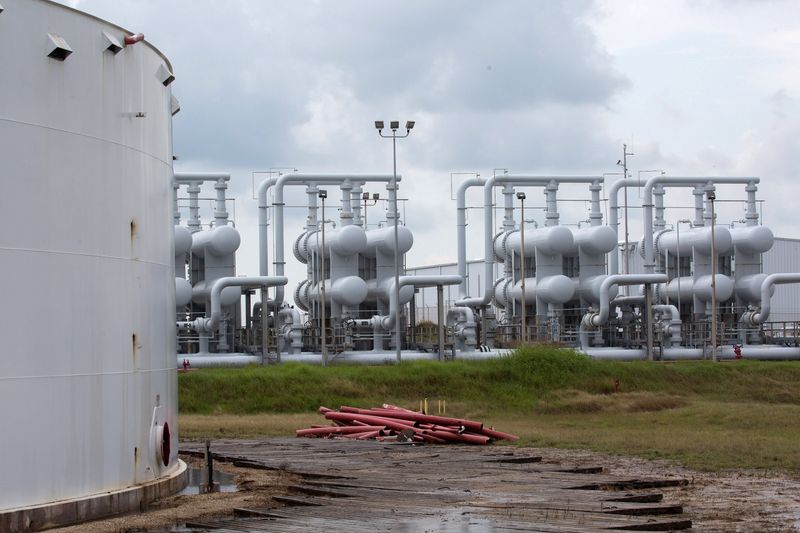By Trevor Hunnicutt, Jarrett Renshaw and Timothy Gardner
WASHINGTON (Reuters) - The Biden administration has asked some of the world's largest oil consuming nations - including China, India and Japan - to consider releasing crude stockpiles in a coordinated effort to lower global energy prices, according to several people familiar with the matter.
The unusual request comes as U.S. President Joe Biden fends off political pressure over rising pump prices and other consumer costs driven by a rebound in economic activity from lows plumbed early in the coronavirus pandemic.
It also reflects U.S. frustration with members of the Organization of the Petroleum Exporting Countries and its allies who have rebuffed repeated requests from Washington to speed up their production increases.
"We're talking about the symbolism of the largest consumers of the world sending a message to OPEC that 'you've got to change your behavior,'" one of the sources said.
In Asia, where China said it is working on a crude release, oil prices extended declines prompted by the U.S. request, after settling on Wednesday further below seven-year highs struck in early October.
Biden and top aides have discussed the possibility of a coordinated release of stockpiled oil with close allies including Japan, South Korea and India, as well as with China, over the past several weeks, the sources said.
The US and allies have coordinated strategic petroleum reserve releases before, for example in 2011 during a war in OPEC member Libya.
But the current proposal represents an unprecedented challenge to OPEC, the cartel that has influenced oil prices for more than five decades, because it involves China, the world's biggest importer of crude.
A Japanese industry ministry official said the United States has requested Tokyo's cooperation in dealing with higher oil prices, but he could not confirm whether the request included coordinated releases of stockpiles. By law, Japan cannot use reserve releases to lower prices, the official said.
A senior cabinet official declined to comment.
China's state reserve bureau said it was working on a release of crude oil reserves although it declined to comment on the U.S. request.
A South Korean official confirmed the United States had asked Seoul to release some oil reserves.
"We are thoroughly reviewing the U.S. request, however, we do not release oil reserve because of rising oil prices. We could release oil reserve in case of supply imbalance, but not to respond to rising oil prices," the official said.
The U.S. share of any potential release of reserves would need to be more than 20 million to 30 million barrels to affect markets, according to a U.S. source who participated in the discussions. Such a release could be in the form of a sale or a loan from the U.S. Strategic Petroleum Reserve - or both.
The SPR was set up in the 1970s after the Arab Oil Embargo to ensure the United States has adequate supply to weather an emergency. U.S. crude oil in Strategic Petroleum Reserves, https://fingfx.thomsonreuters.com/gfx/ce/klpykdleepg/USCrudeSPRNov2021.png
Several people familiar with the matter cautioned that negotiations over a coordinated supply release have not been finalized nor has any final decision been made about whether to pursue any specific course of action on oil prices.
The White House declined to comment on the detailed content of conversations with other countries.
After Reuters reported on the White House discussions, U.S. crude and global benchmark Brent slumped, with the latter dropping below %80 a barrel. [O/R]
OPEC and other producers including Russia, known collectively as OPEC+, have been adding around 400,000 barrels per day to the market on a monthly basis, but have resisted Biden's calls for more rapid increases, arguing the rebound in demand could be fragile.
OPEC Secretary General Mohammad Barkindo said on Tuesday he expected a global supply surplus to emerge as soon as December.
"These are signals that we have to be very, very careful," he told reporters.
Rising oil prices have vexed Biden ahead of the 2022 midterm elections which will determine whether his Democratic party maintains slim majorities in the U.S. Congress.
U.S. gasoline prices average $3.41 per gallon recently, according to AAA, more than 60% higher than a year ago as the economy has rebounded from the COVID-19 pandemic.

Several Biden aides attribute his falling public approval ratings in recent months to worsening inflation from energy to food and other areas. The consumer price index is up 6.2% over the last 12 months, with its energy components up 30%.
The Paris-based International Energy Agency, which monitors national SPRs for members that include the U.S. Japan and most western countries, declined to comment. The IEA in the past has coordinated releases involving several countries.